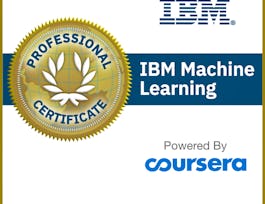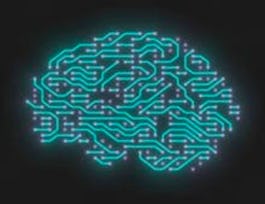An emerging trend in AI is the availability of technologies in which automation is used to select a best-fit model, perform feature engineering and improve model performance via hyperparameter optimization. This automation will provide rapid-prototyping of models and allow the Data Scientist to focus their efforts on applying domain knowledge to fine-tune models. This course will take the learner through the creation of an end-to-end automated pipeline built by Watson Studio’s AutoAI experiment tool, explaining the underlying technology at work as developed by IBM Research. The focus will be on working with an auto-generated Python notebook. Learners will be provided with test data sets for two use cases.



Machine Learning Rapid Prototyping with IBM Watson Studio


Instructors: Mark J Grover
Sponsored by IEM UEM Group
1,606 already enrolled
(13 reviews)
Skills you'll gain
- Automation
- IBM Cloud
- Feature Engineering
- Scikit Learn (Machine Learning Library)
- Machine Learning Software
- Prototyping
- Artificial Intelligence
- Machine Learning Methods
- Application Lifecycle Management
- Python Programming
- MLOps (Machine Learning Operations)
- Machine Learning
- IT Automation
- Application Deployment
- Product Design
- Applied Machine Learning
- Machine Learning Algorithms
- Artificial Intelligence and Machine Learning (AI/ML)
- Statistical Machine Learning
- Robotic Process Automation
Details to know

Add to your LinkedIn profile
13 assignments
See how employees at top companies are mastering in-demand skills


Earn a career certificate
Add this credential to your LinkedIn profile, resume, or CV
Share it on social media and in your performance review

There are 4 modules in this course
In this module, you'll learn about the developing landscape of AutoAI technologies. You'll also become familiar with the Watson Studio platform in order to be able to perform your own AutoAI Experiments. After observing the AutoAI tool build prototypes for two use cases, you will try out the tool for yourself to build additional prototypes.
What's included
7 videos14 readings4 assignments
In this module, you will learn about the automated data preparation techniques performed by AutoAI and get a chance to experiment with different settings for data preprocessing in the AutoAI-generated Python notebook. You'll also learn about the procedure for automated model selection and experiment using different models on the datasets.
What's included
9 videos11 readings3 assignments
In this module, you will learn about the algorithm for automated feature engineering and perform some exploratory data analysis to try to understand why the algorithm performed particular feature transformations. You'll also learn about sophisticated methods for optimizing hyperparameters and explore hyperparameter tuning on the datasets using the AutoAI-generated Python notebook.
What's included
9 videos11 readings3 assignments
In this module, you will evaluate prototypes using the different evaluation metrics calculated by the AutoAI tool. You will also deploy the prototype for testing using the Watson Machine Learning API.
What's included
4 videos9 readings3 assignments1 peer review
Instructors

Offered by
Why people choose Coursera for their career




Learner reviews
13 reviews
- 5 stars
69.23%
- 4 stars
0%
- 3 stars
15.38%
- 2 stars
0%
- 1 star
15.38%
Showing 3 of 13
Reviewed on Sep 13, 2020
Very much informative and useful with hands on excercise
Recommended if you're interested in Data Science

Coursera Project Network

Open new doors with Coursera Plus
Unlimited access to 10,000+ world-class courses, hands-on projects, and job-ready certificate programs - all included in your subscription
Advance your career with an online degree
Earn a degree from world-class universities - 100% online
Join over 3,400 global companies that choose Coursera for Business
Upskill your employees to excel in the digital economy







